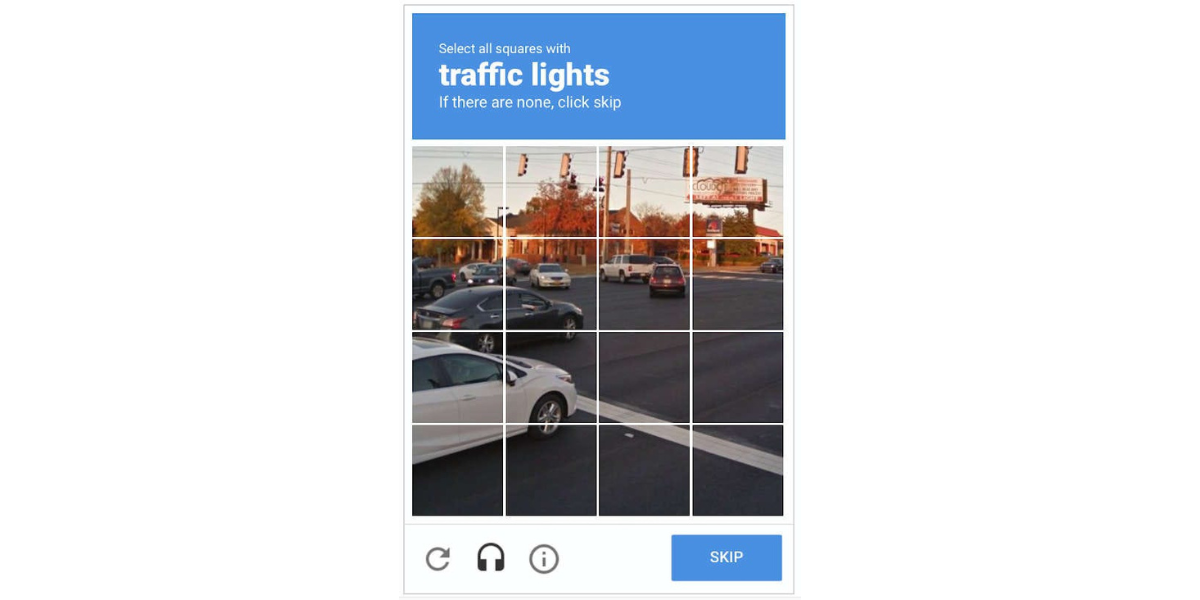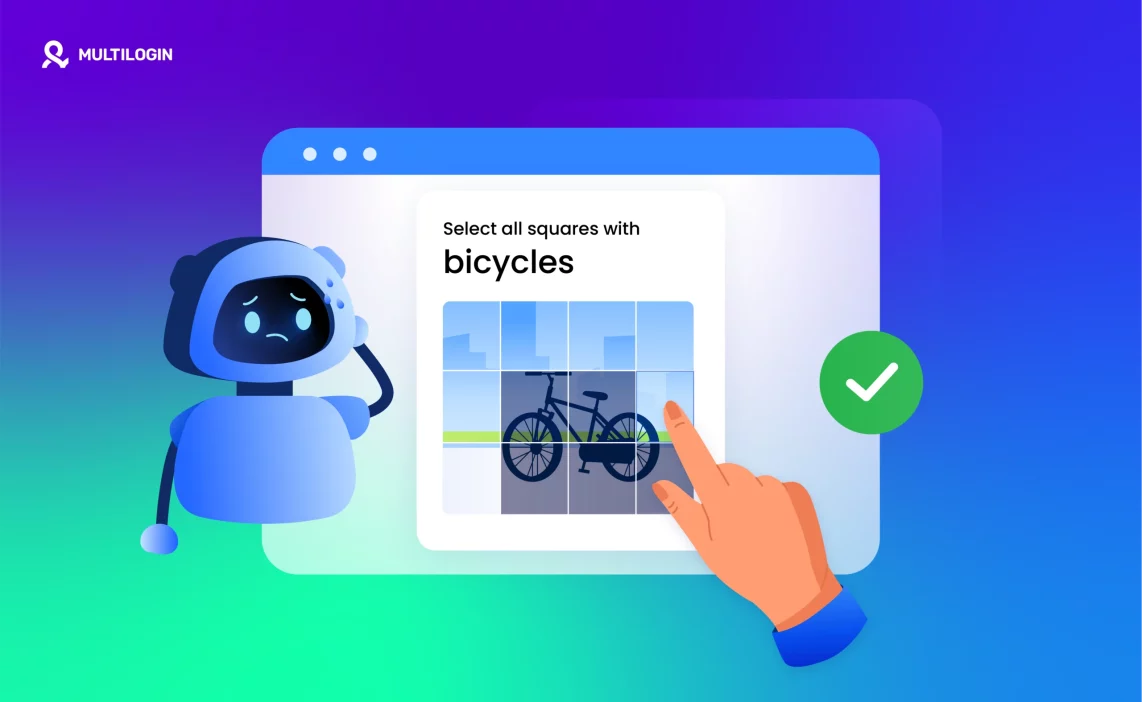CAPTCHAs slow you down. They break your automation, block your logins, and waste your time.
You’ve probably seen those annoying little tests—“Click all the fire hydrants” or “I’m not a robot.” They’re everywhere. But if machines are so advanced, why can’t they pass CAPTCHA?
The answer is simple: they don’t move, think, or react like we do. In this article, we’ll break down how CAPTCHA works, why machines fail, and how you can avoid CAPTCHAs altogether—without slowing down your workflow.
What is CAPTCHA, and why is it used?
CAPTCHA stands for “Completely Automated Public Turing test to tell Computers and Humans Apart.” It’s a small test that websites use to block bots.
You’ve seen them before—clicking traffic lights, typing distorted text, or checking a box that says, “I’m not a robot.”
Websites use CAPTCHA to stop bots from:
- Filling out forms
- Posting spam
- Managing multiple accounts from the same device or IP: Multi-account management
- Scraping data
- Logging in with stolen credentials

These tests are simple for humans, but hard for machines. That’s the point. CAPTCHA protects websites from automated attacks and fake traffic.
Why can’t machines pass CAPTCHA?
CAPTCHAs were made to spot the difference between real people and bots. And no matter how advanced machines get, they still struggle to act human. Here’s why.
1. Lack of human-like mouse movement
When you move your mouse, it’s never perfect. You pause, hesitate, maybe even overshoot a button. Bots don’t do that. They go straight from point A to B with exact precision.
CAPTCHA systems know this. They look at how you move—your speed, pauses, and how natural the path is. If the movement feels robotic, you fail.
2. No pattern recognition or context
You can spot a traffic light even if it’s blurry, dark, or half-visible. That’s pattern recognition. Bots still struggle with that. They see images in pieces, not in context.
CAPTCHAs often show partial or tricky images that require some guesswork. You handle it easily. Bots don’t.
3. No imperfection = red flag
Humans make small mistakes. We click off-center. We take a second too long. Bots don’t.
They move fast, click precisely, and never mess up. That’s actually the problem. Perfect behavior looks fake. And that’s exactly what triggers CAPTCHA.
4. Behavioral signals are missing
Modern CAPTCHA tools collect data long before you even click anything. They look at:
- Your browser fingerprint
- How fast you click
- What network you’re on
- How long you stay on the page before acting
If these signals don’t match what a real user would do, the system blocks you.

Can bots learn to pass CAPTCHA?
Some bots are getting smarter. They use machine learning to guess patterns or mimic clicks. But CAPTCHA systems evolve just as fast. Newer versions, such as Cloudflare Turnstile or Google reCAPTCHA v3, don’t rely solely on images. They watch everything from click speed to browser behavior and IP reputation.
Bots might get through once in a while. But over time, they’re flagged. Even advanced bots fail more often than they succeed.
CAPTCHA solvers vs CAPTCHA avoidance
Getting past a CAPTCHA is one thing. Avoiding it entirely is smarter.
Solvers: A patch, not a fix
CAPTCHA solvers jump in after the damage is done. They try to “solve” the challenge once it appears.
Here’s the catch:
- They often get blocked
- They slow down your automations
- They can get your accounts banned
Solvers treat the symptom, not the cause. You’re already flagged by the time they kick in.
Avoidance: Stay undetected from the start
The smarter approach? Never trigger CAPTCHA in the first place.
Websites show CAPTCHA when they sense something off—like a fake browser, strange IP behavior, or bot-like clicks. But if you look and act like a real user, there’s no reason to challenge you.
That’s exactly where Multilogin comes in.
It’s not just an antidetect browser. It’s a full setup that makes your online profile look real:
- Custom browser fingerprints
- Warmed-up profiles with cookies
- Built-in residential proxies
- Android profile emulation
- Daily tests on 50+ websites
With Multilogin, you stay under the radar. Sites see you as a regular user. No CAPTCHA. No bans. No headaches.
Start your 3-day trial for only €1.99 — no risk, full access.
How does Multilogin help you skip CAPTCHA entirely?
Most tools try to solve CAPTCHA after it shows up. Multilogin takes a smarter route — it makes sure you don’t trigger it in the first place. When websites look for signs of automation, they check your browser fingerprint, IP quality, mouse behavior, and even the history behind your profile. Multilogin builds all of that into every session, so the site sees a real person, not a bot. No alerts, no flags, no CAPTCHA walls.
✅ Real browser fingerprints that mimic real users, not bots
✅ Pre-warmed profiles with cookies and natural browsing history
✅ Built-in residential proxy traffic — no need for third-party setups
✅ Tested daily on 50+ high-risk sites like Google, Facebook, Amazon
✅ One-click profile creation to launch clean, undetectable sessions fast
✅ Android profile emulation — look legit on both desktop and mobile
✅ Works with automation tools like Puppeteer and Selenium without red flags
✅ Keeps your accounts completely unlinked — no accidental cross-fingerprints
✅ Avoids reCAPTCHA, hCaptcha, and Turnstile from ever showing up
When should you still use a CAPTCHA solver?
Sometimes, using a solver makes sense. If you’re doing a quick login, testing a new site, or running light tasks where full browser control isn’t critical, a CAPTCHA solver might be enough. It’s not the most reliable option for long-term or large-scale work, but it can do the job when speed matters more than stealth.
- For quick one-off logins or manual tests
- When automating on unknown or low-risk platforms
- When you don’t need full browser control or long session persistence
FAQs about Why can’t machines pass CAPTCHA?
Because they lack natural movement, make no mistakes, and can’t process real-world context the way people can. CAPTCHA tools flag anything that looks too perfect.
Bots struggle to recognize partial, blurry, or rotated images. They lack the visual context that humans use to understand real-world objects like stop signs or crosswalks.
AI bots can sometimes pass CAPTCHA, but not reliably. As bots improve, so do CAPTCHA systems. Newer tools like reCAPTCHA v3 and Turnstile look at your behavior, browser fingerprint, and more—making it hard for bots to fake it.
Solving CAPTCHA means reacting after the test appears. Avoiding CAPTCHA means preventing it from showing up at all. Avoidance is safer and more efficient for long-term automation or multi-account workflows.
Multilogin avoids CAPTCHA by making your browser and behavior look human. It uses real fingerprints, residential IPs, cookies, and automation support to prevent detection and keep your sessions running smoothly.
CAPTCHA solvers work on basic tests, but they’re risky and often blocked. They can slow you down and get you banned. They’re not reliable for large-scale use or long-term projects.
You should use a CAPTCHA solver only for quick, one-off tasks. If you’re doing something simple like testing or a manual login on an unknown platform, solvers might help—but for scale, they’re not practical.
Conclusion
If you are struggling, why Can’t Machines Pass CAPTCHA? Because they don’t think or act like humans. They move perfectly, never hesitate, and lack context—all things CAPTCHA systems use to spot bots. Solvers try to react, but Multilogin helps you avoid the challenge from the start. If you run multiple accounts or automate workflows, avoiding CAPTCHA is the only way to stay undetected, fast, and productive.


